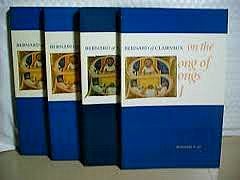
Lately I’ve been reading through St. Bernard’s four volumes of sermons on the Song of Songs. I find it both spiritually edifying and historically interesting.
Frequently, St. Bernard’s descriptions of the moral terpitude of twelfth-century Europe sound scarcely any different from contemporary American culture. Truly there is “nothing new under the sun.”
St. Bernard’s style of exegesis is certainly a far cry from the methods one learns in modern graduate programs in Scripture. In truth, St. Bernard often simply uses his text—typically a single verse or part of a verse from the Song—to provide him with a theological or spiritual theme which he then expounds.
And he takes his time! I’m up to about his twenty-fifth sermon, and he is still only about three verses into the first chapter!
One can ask if there is any legitimacy to his method, or if the saint is simply engaging in eisegesis—that is, reading his theology into the text.
I think one can ground St. Bernard’s method theologically and philosophically, if one has a robust notion of the creation of mankind in the image of God. If such is the case, human love does truly mirror the love which resides in God between the persons of the Trinity, and is expressed to man through the processions of the Son and Spirit. So the Song of Songs, which in the first instance is an exploration of the phenomenon of human love, can be used as the basis for insights into the love of God and our love for him.